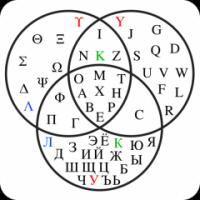Ujumbe: 22
Lugha: English
ceigered (Wasifu wa mtumiaji) 8 Januari 2010 11:01:25 asubuhi
- Mi sidis, leganta libron,
- Mi sidis, leginta libron,
- Mi sidis, legante libron,
or
- Mi sidis, leginte libron?
(my main problems are the a/e distinction and accusative in the second phrase (solvable by going "Mi legis libron, sid-nt-"), my next problem is tense - I'm going for "ant-" in this sentence, with "int-" possibly meaning "having been reading").
Then there's always the choice of "Mi sidis kaj legis libron."

Cheers!
tommjames (Wasifu wa mtumiaji) 8 Januari 2010 11:43:22 asubuhi
- Mi sidis, leganta libron. I sat, reading a book.
- Mi sidis, leginta libron. I sat, having read a book.
- Mi sidis, legante libron. I sat, reading a book.
- Mi sidis, leginte libron. I sat, having read a book.
The difference between the "a" and "e" forms is that the former describes your state when you were doing the action, while the latter describes the manner of your doing the action. As you can see above we'd render both ideas the same in English but it's possible to conserve the nuance in Esperanto via the a/e endings.
ceigered (Wasifu wa mtumiaji) 8 Januari 2010 12:05:34 alasiri
tommjames (Wasifu wa mtumiaji) 8 Januari 2010 12:23:17 alasiri
Rogir (Wasifu wa mtumiaji) 8 Januari 2010 3:26:30 alasiri
matrix (Wasifu wa mtumiaji) 8 Januari 2010 4:26:54 alasiri
[LISTO]
Mi sidiĝis, legante libron.[/list][LISTO]
Mi eksidis, legante libron.[/list]“legante libron” completes the main verb (“sidis”, “eksidis”, “sidiĝis”), so it would be better to use the -e form.
Rogir (Wasifu wa mtumiaji) 8 Januari 2010 5:11:18 alasiri
horsto (Wasifu wa mtumiaji) 8 Januari 2010 6:10:10 alasiri
For me it's an error to use the 'a' form, you can read how to use the 'e' form
here.
ceigered (Wasifu wa mtumiaji) 8 Januari 2010 6:53:04 alasiri
 )
) horsto (Wasifu wa mtumiaji) 8 Januari 2010 7:31:09 alasiri
niko-tina: With the -e ending, you would link it to the verb, sidis.That's not what PMEG says:
PMEG:That means, the participe is linked to the subject, not to the verb.
Participo kun E-finaĵo montras kroman agon, kiu rilatas al la subjekto de la frazo. Anstataŭ diri du frazojn, unu por ĉiu ago, oni kunmetas la frazojn al unu:
Li legis sian libron kaj manĝis samtempe pomon. → Manĝante pomon li legis sian libron. La manĝado daŭris samtempe kun la legado.
niko-tina:I don't see the link, I would agree if the sentence would be:
If you say "Mi sidis, leganta libron" then you are linking leganta with mi.
Mi, leganta libron, sidis.
That's a special way of constructing subfrazojn.





